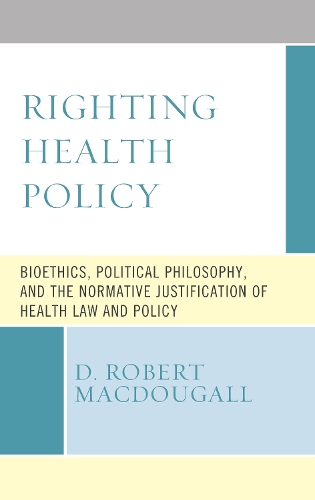
Righting Health Policy: Bioethics, Political Philosophy, and the Normative Justification of Health Law and Policy
(Hardback)
Publishing Details
Righting Health Policy: Bioethics, Political Philosophy, and the Normative Justification of Health Law and Policy
By (Author) D. Robert MacDougall
Bloomsbury Publishing PLC
Lexington Books
23rd February 2022
United States
Classifications
Professional and Scholarly
Non Fiction
Medicolegal issues
Social and political philosophy
Central / national / federal government policies
174.2
Physical Properties
Hardback
254
Width 163mm, Height 227mm, Spine 24mm
540g
Description
In Righting Health Policy: Bioethics, Political Philosophy, and the Normative Justification of Health Law and Policy, D. Robert MacDougall argues that bioethics does not have adequate tools for justifying its normative recommendations for law and policy. Bioethics tools are mostly theories about what we owe each other. But justifying laws and policies requires more; at a minimum, it requires explaining the basis on which we may control or influence others to do what they are supposed to do, which lies within the realm of political and not moral philosophy.
MacDougall develops an interpretation of Kants moral and political philosophy and uses this account to show the importance of political philosophy for bioethics. He argues that a theory of political legitimacy is necessary for distinguishing between what is morally required and what is legally enforceable. MacDougall also argues that in some cases, an account of political authority is necessary for settling the content of not only our legal rights and duties but also our moral ones. The Kantian account shows why the content of physicians dutieslegal and moralto inform patients prior to treatment remain indeterminate outside of a state with authority to conclusively settle what counts as valid consent.
Reviews
"In Righting Health Policy, MacDougall argues that since bioethics addresses questions of law and policy its discussions should be informed by political philosophy, especially Kantian political philosophy. MacDougall's defense of this revolutionary view is careful, scholarly, and persuasive--and given the importance of Kantian theory in bioethics, must be taken seriously by all who work in this field."
-- James Stacey Taylor, The College of New Jersey"Much of bioethics is deeply engaged in biopolitics. Yet, as D. Robert MacDougall argues, all too often its political aspirations lack any solid intellectual foundation. Righting Health Policy: Bioethics, Political Philosophy, and the Normative Justification of Health Law and Policy offers an engaging critique of the field, exploring ways in which philosophical analysis regarding the legitimate function of government is largely absent from major works on healthcare policy and bioethical methodology. The result is an important conceptual geography regarding the role of careful political philosophy for bioethics, including application to such topics as the distribution of healthcare, research on human subjects, organ transplantation, and informed consent."
-- Mark J. Cherry, St. Edward's University"This book should be read by any bioethicist who wants to recommend change in laws, regulation, or public policy. It shows convincingly that such recommendations require engagement with deep issues in political philosophy and cannot be made on the basis of ethical analysis alone. In the detailed analysis it also shows that bioethicists have often appropriated the ethics of famous philosophers while completely ignoring their political philosophy leading to unacknowledged inconsistencies."
-- Sren Holm, University of Manchester"D. Robert MacDougall has done us all a service with this thought-provoking and carefully argued examination of the role political philosophy should play in bioethics and the way that failing to engage with political philosophy impoverishes and foreshortens bioethical argument. His treatment of Kantian themes is particularly welcome, as bioethics has tended to overlook or downplay the value of Kantian arguments. He shows how illuminating these can be, particularly in debates about organ transplantation and markets in organs. This is an important contribution to bioethics and to thinking about public policy for biomedicine."
-- Richard Ashcroft, City Law SchoolAuthor Bio
D. Robert MacDougall is associate professor of philosophy at New York City College of Technology (CUNY).
